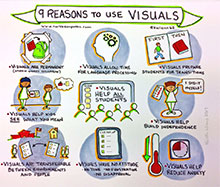A Fresh Approach
This fourth-grade teacher doesn’t take away recess or use points to manage the class. Instead she’s built a culture of respect.
How do teachers captivate their students? Here, in a feature we call How I Teach, we ask great educators how they approach their jobs. You can see other pieces in this series here.


 Early Intervention and School Readiness
Early Intervention and School Readiness Early Intervention and School Readiness
Early Intervention and School Readiness